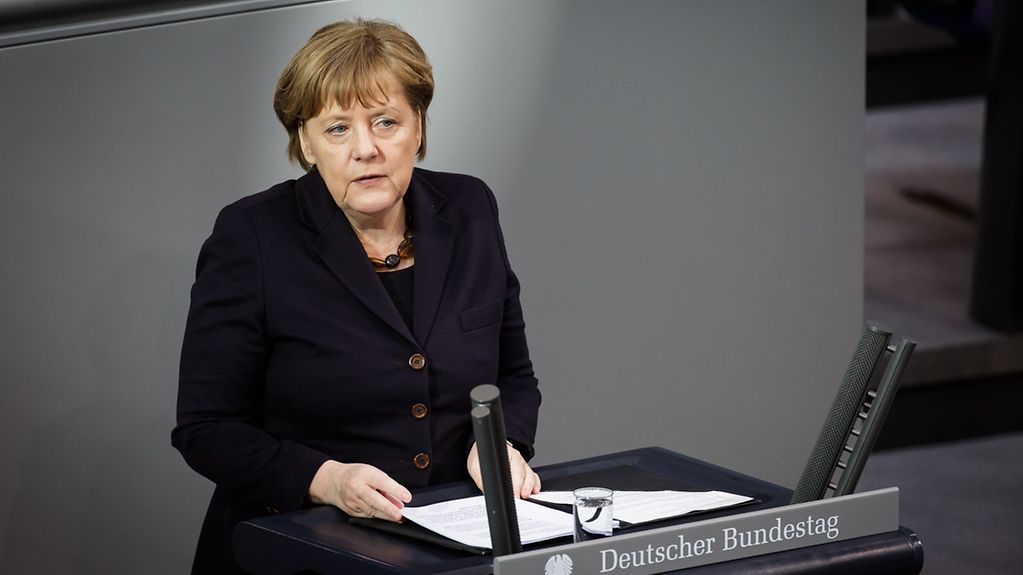Policy statement by the Federal Chancellor
"Pursuing this agenda is worth the effort," said the Chancellor in her policy statement delivered shortly before the EU Summit in Brussels. She will make every effort to promote a European-Turkish solution to the refugee crisis, she said. Merkel showed understanding for many of Britain's demands for reform.

Merkel: Fundamental achievements of the EU, free movement of persons and non-discrimination, are not up for disposal
Photo: Bundesregierung/Steins
The Chancellor said she would work toward results in negotiations with Britain that "not only would Britain itself profit from in the end but also Germany and all of Europe". Merkel underscored this in her policy statement made just before the European Council meeting on 18 and 19 February in Brussels.
Britain's concerns, said the Chancellor, are "justified and understandable" in many respects; this is far from being a matter "of only British special interests," Merkel stressed. Among others, she was also of the opinion that non-euro countries should not be ignored in matters important to them. Here, discrimination must be avoided and at the same time differentiation allowed.
Not up for disposal: freedom of movement and non-discrimination
Moreover, said Merkel, Britain's interests in eliminating false incentives in the social system for migrants are valid. "That's why I find it obvious that every member state must be in a position to protect its social system against abuse". However, she added, this protection must not compromise fundamental European achievements, particularly freedom of movement and non-discrimination."These two principles are not up for disposal". She said that in negotiations this basic position would have to be reconciled with British wishes for reform.
At present, said Merkel, the European Council would not adopt any amendments to agreements. Negotiations would have to be taken into consideration later in the next revision of the European Treaties. The German Bundestag would then participate as well.
The British government has announced a referendum on continued membership of the country in the European Union. In the run-up to the referendum, the government has made demands for reforms that will be referred to the European Council on 18 and 19 February. The President of the European Council, Donald Tusk, will lead negotiations. In a letter dated 2 February, Tusk sent compromise proposals, which shall form the basis of European Council negotiations, to the EU member states.
"A historic challenge"
The Chancellor said she saw Europe as facing a historic challenge because of the refugee crisis. The coming European Council meeting will not be a question of agreeing on quotas again.
Instead, the question should be: "Have we made so much progress with our European-Turkish approach within the framework of the EU-Turkey Agenda that it's worth continuing along this path because it allows illegal migration to be perceptibly curbed, which is the crucial prerequisite for legal quotas? Or are we going to have to give up and instead, as some are vehemently demanding, close the Greek-Macedonian-Bulgarian border despite all the consequences for Greece and the European Union on the whole?"
Sustained reduction of the number of refugees
The Chancellor said she would leave no stone unturned in bringing about a European-Turkish solution. The solution would "reduce the number of refugees perceptibly and sustainably so that those people can continue to be helped who really need our protection". To this end, the causes of migration will have to be tackled, the EU external borders--particularly between Greece and Turkey--protected and the entry of refugees organised and managed.
"There's no doubt that in the long term fewer people will come to us only if we carry out measures at the places they are coming from and remedy the causes that are forcing them to flee". Among others, Merkel called to mind the successes of the London Donors Conference on 4 February during which over 11 billion dollars was provided for humanitarian assistance. In terms of the size of the assistance, she said, this was the most successful donors conference in the history of the United Nations.
Safe zones in Syria, protection of maritime borders
Merkel spoke in support of safe zones in Syria: "It would be helpful if there were an area protected from air assaults by any of the warring parties". She said that if success were achieved in reaching an agreement on a sort of no-fly zone "many human lives would be saved and it would also serve the political process for the future of Syria".
The Chancellor emphasized the importance of protecting maritime borders: "As the European Union, we must learn how to protect our maritime borders". This is more difficult than securing land borders. "If we can't learn how to do it, then we also won't succeed in doing it the next time Italy deals with Libya".
Merkel said that much had been accomplished on the national level. Refugees arriving at the German-Austrian border are now being registered and controlled. There is now a uniform refugee identity card that is gradually being phased in, a second asylum package is under discussion this week, and her cabinet has taken a decision on additional safe countries of origin. Moreover, she said, conditions have been set for quicker deportations of criminal refugees.
A stage on the European road
The European Council meeting on 18 and 19 February, said Merkel, will not end the discussion on both subjects; the meeting will merely be a "stage". Nevertheless, she added that up to now Europe has always emerged stronger from every crisis, "and I hope that can be the case this time, too".
Federal Chancellor Merkel will attend the European Council meeting in Brussels on 18 and 19 February. Two issues will be on the agenda: Britain's relations with the EU and EU migration policy.